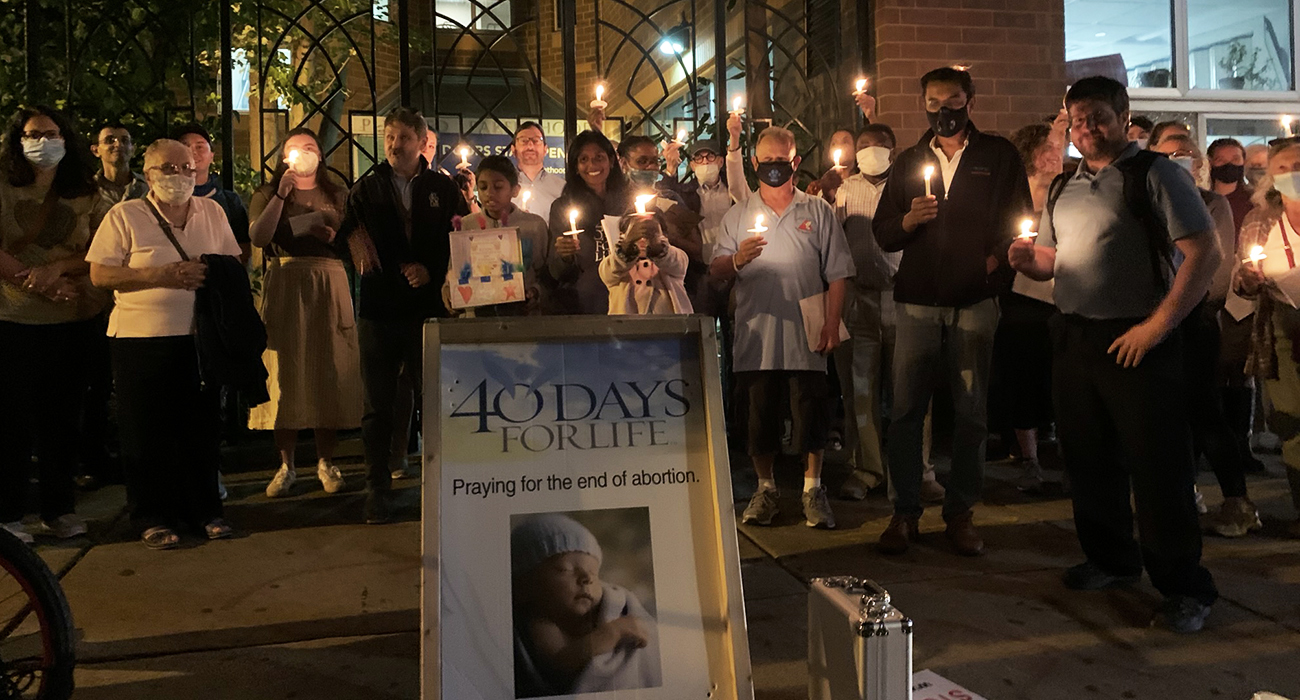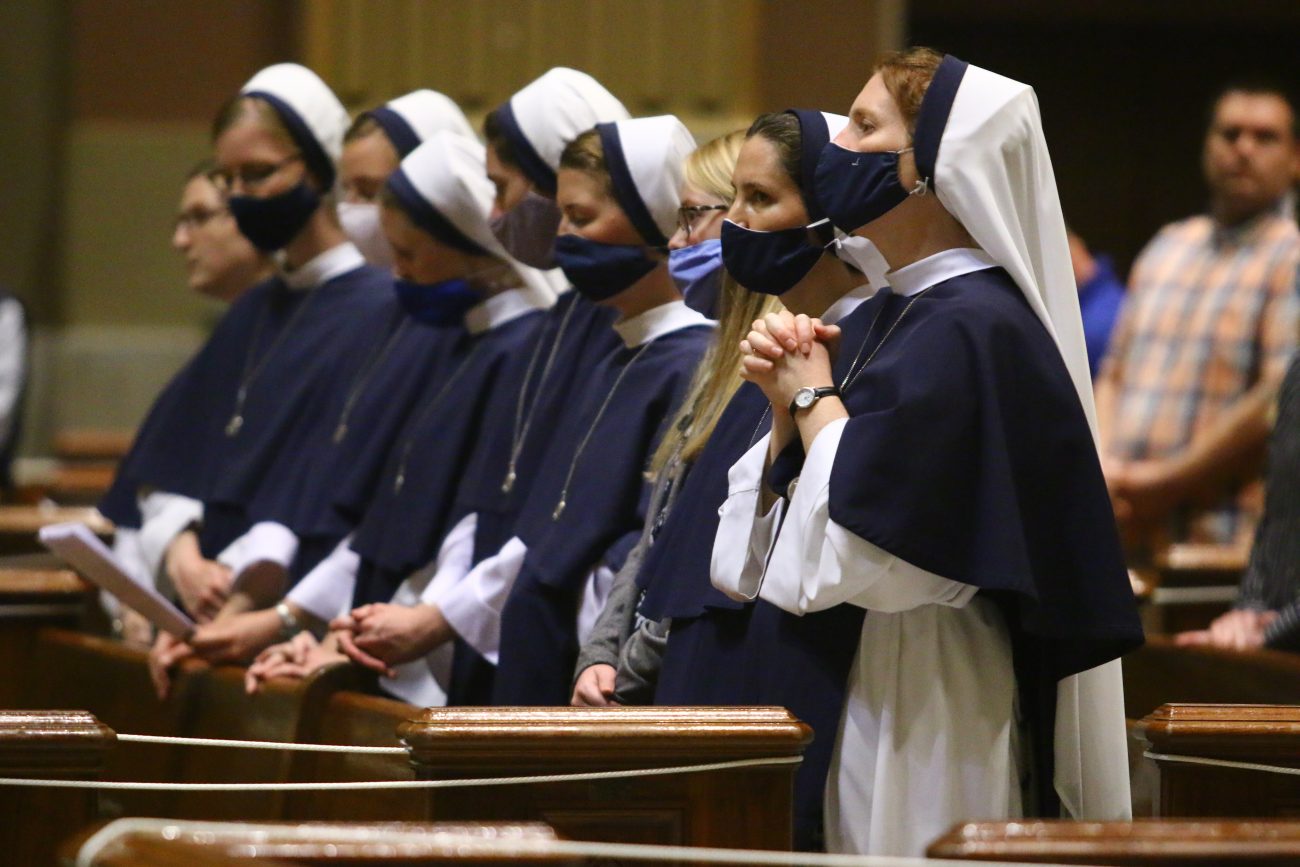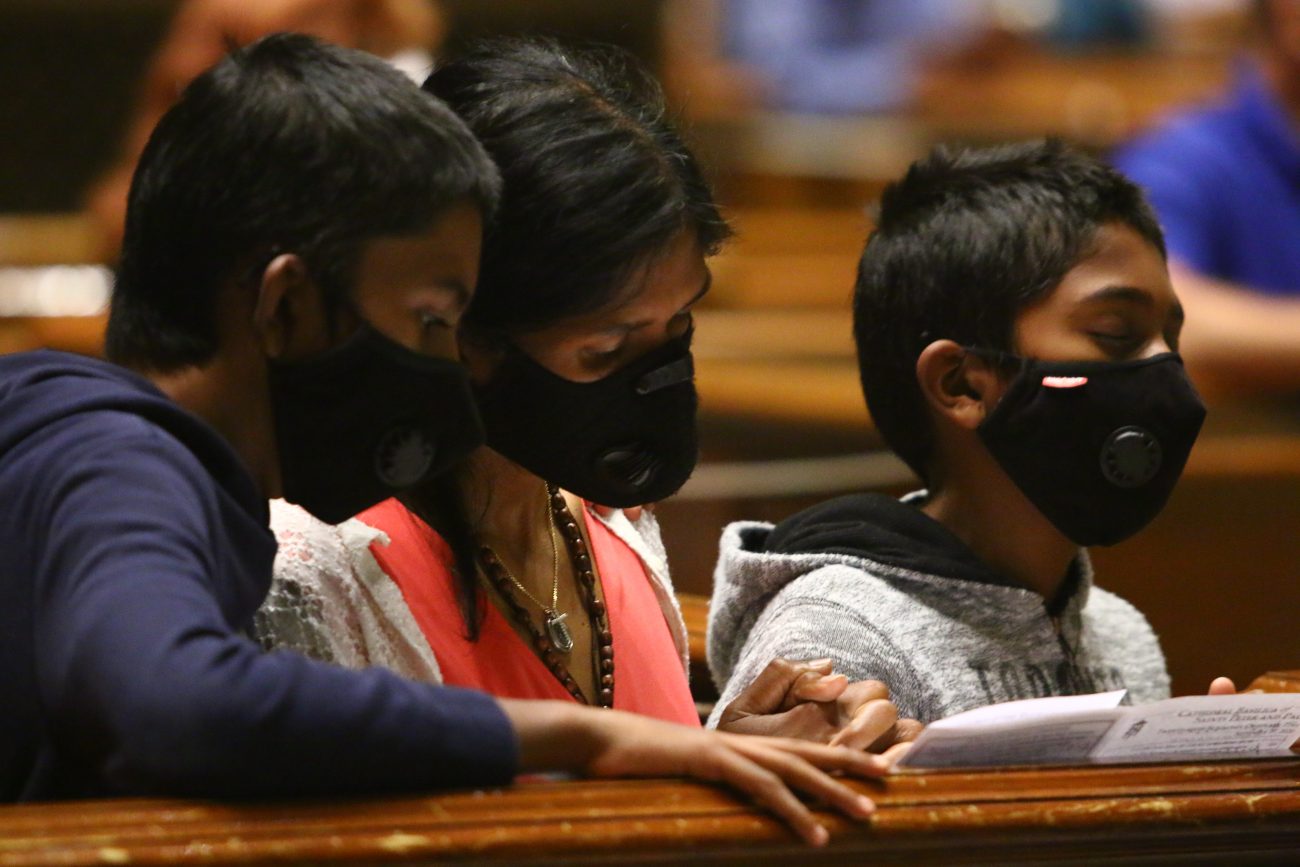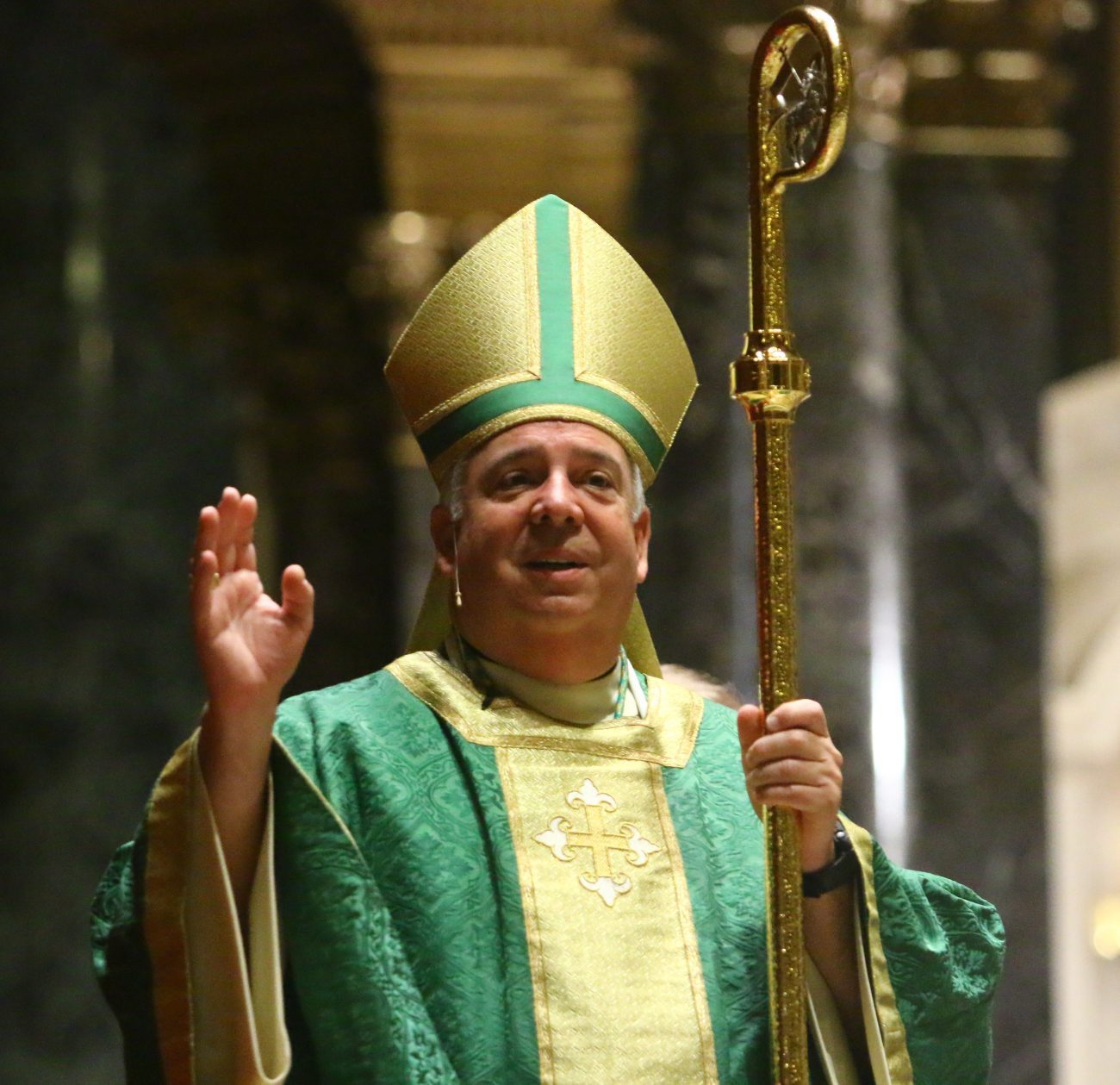
Some 50 participants gathered Sept. 23 outside of Planned Parenthood in downtown Philadelphia for a candlelight prayer vigil to end abortion. Sponsored by the international movement 40 Days for Life, the event marked the start of a five-week campaign seeking to end abortion through prayer, fasting and outreach that also coincides with the Catholic Church’s observance of Respect Life Month in the United States. (Photo by Gina Christian)
A five-week pro-life campaign was launched in the Archdiocese of Philadelphia last week as the Catholic Church in the United States celebrates Respect Life Month, the annual October observance that focuses on upholding human dignity at all stages of life.
Some 50 participants gathered Sept. 23 at the Center City Philadelphia location of Planned Parenthood for a candlelight vigil organized by 40 Days for Life. The global movement, which is active in 63 countries since its founding in 2007, advocates for an end to abortion through prayer, fasting, vigils and community outreach.
[hotblock]
“We started praying here at eight o’clock this morning,” said Patrick Stanton, co-chair of the organization’s Philadelphia chapter and a board member of the Pro-Life Union of Greater Philadelphia. “And this is going to continue for 40 days.”
Statistics down, but racial divides up
Stanton said some 4,000 abortions are performed each year at the downtown Planned Parenthood site, with an estimated 6,500 taking place at the Women’s Center, a separate abortion facility in the city’s Chinatown section.
Although abortions have declined significantly, he said, the numbers are still “terrible.”
According to the Guttmacher Institute, abortion rates in the U.S. reached a historic low in 2017, when approximately 862,320 (or 13.5 per 1,000 women aged 15 to 44) were performed. That figure marked an 8% drop from 2014 totals.
[tower]
Overall, women of color are disproportionately affected by abortion, with Guttmacher reporting that in 2014, Black and Hispanic clients combined accounted for 53% of the U.S. women seeking abortions.
Those numbers are an everyday reality for vigil attendee Marlene Dowling, director of the Philadelphia-based HOPE Pregnancy Center.
“I work in North Philadelphia, an area that is predominantly African American,” said Dowling, a Black mother of two who disclosed that she herself had two abortions.
Stanton described Planned Parenthood founder Margaret Sanger as a “eugenicist and racist” who sought to eliminate groups she considered undesirable.
“We’ve reported on Sanger’s testimony, her exact words: ‘We do not want word to go out that we want to exterminate the Negro population,’” Stanton said, quoting a 1939 letter in which Sanger detailed her efforts to counter what she called the “ignorance, superstition and doubts” of Blacks regarding contraception and abortion.
Stanton said the Black population — “which should be around 15% to 20% right now” and which the Census Bureau currently estimates at 13.4% — has been “decimated by abortion.”
“You want to see racism, it’s right there,” said Stanton.
Providing resources
Poverty and lack of social service supports, two consequences of systemic racism, often drive pregnant women to consider abortion, said Dowling.

The Sisters of Life participated in a Sept. 27 Mass at the Cathedral Basilica of SS. Peter and Paul that marked the start of the 40 Days for Life campaign, which seeks to end abortion through prayer, fasting and community outreach. Prior to the liturgy, which was celebrated by Archbishop Nelson Pérez, the sisters led a holy hour for life. (Sarah Webb)
“They feel that they have to do it, because it’s so much of a stress, and they’re thinking, ‘Well, I can’t take care of myself, so how can I take care of someone else?’” said Dowling. “But there are resources that are available to them that they may not know of, and that I can provide for them.”
As a society, she added, “we have to step up” in comprehensively caring for pregnant women and new mothers.
Abortion “is not just a problem of the person who is thinking about it,” said Dowling. “It’s our problem, and we have to begin to know that and do something about it.”
That proactive approach is essential to the 40 Days for Life movement, said vigil keynote speaker Matt Britton, a board member and general counsel for the organization.
“It’s not our neighbor, it’s not the government, it’s us,” said Britton. “Stop looking around and look in the mirror.”
Britton, whose talk was frequently interrupted by an unidentified female heckler, also encouraged attendees to undertake their witness and outreach “with love.”
Pro-Life Union communications coordinator Anna Roper agreed, saying the vigil and campaign were intended to mark “a healing moment for the city.”

Dr. Monique Ruberu (center), co-chair of the Philadelphia 40 Days for Life group, prays with her family during a Sept. 27 Mass at the Cathedral Basilica of SS. Peter and Paul that marked the start of the five-week vigil to end abortion. (Sarah Webb)
“Abortion is a violent act” that damages both baby and mother, said Roper, citing the grief, depression and shame experienced by many women after undergoing an abortion.
Such effects (known in mental health terms as “sequelae”) can be compounded by lack of widespread recognition for an actual post-abortion syndrome, Roper noted.
“So you feel like you should be sad for this, but people are telling you that you shouldn’t be sad,” she said. “I think there’s a lot of confusion mixed up in there, and they probably just don’t know where to go, so that’s why we’re here.”
‘For a moment, you almost weren’t born’
Offering hope to women in crisis pregnancies is part of the church’s mission, said Archbishop Nelson Pérez, who celebrated a Sept. 27 Mass at the Cathedral Basilica of SS. Peter and Paul in honor of the 40 Days for Life campaign. The liturgy was preceded by a holy hour led by the Sisters of Life.
Speaking to some 350 attendees, Archbishop Pérez recounted a moving experience from his days as a Philadelphia priest, when he found a pregnant young woman waiting for him one morning on his office doorstep.
Shunned by her family, “she really felt she had no options” other than abortion, said the archbishop.

Archbishop Nelson Pérez blesses faithful at a Mass he celebrated Sept. 27 at the Cathedral Basilica of SS. Peter and Paul to mark the start of the 40 Days for Life campaign, which coincides with Respect Life Month in the U.S. (Sarah Webb)
After connecting her with pregnancy and parenting resources, “she was able to make it through and bring that boy to life, to the world,” said Archbishop Pérez, who sees both mother and son on occasion.
“I look at that young guy, her only son, and I think, ‘For a moment there, you almost weren’t born,’” he said.
When the mother had needed childcare for her infant, then-Father Pérez put her in touch with a former parishioner – one who, during a chance encounter at a train station, had unwittingly consoled the woman as she had wept over her unplanned pregnancy.
At the conclusion of the liturgy, obstetrician and gynecologist Dr. Monique Ruberu related a dramatic intervention, made possible by a 40 Days for Life volunteer, that also saved an unborn child.
Having seen the volunteer displaying a sign on abortion pill reversal options, a pregnant woman who had ingested the medication was eventually able to get in touch with Dr. Ruberu.
After prescribing the reversal treatment, Dr. Ruberu – a co-chair of the Philadelphia 40 Days for Life group – later delivered the woman’s healthy child.
“That child might not have been there if that amazing prayer warrior did not make the choice” to peacefully demonstrate before the abortion clinic, said Dr. Ruberu. “We must stand up for life at all costs. We have no choice.”
‘And that day will come’
Archbishop Pérez said that abortion, gun violence and racial divisions underscored that “the sacredness of life, whether it’s a full-grown adult or a child in the womb, has become cheap.”
The devaluation of human dignity is directly tied to the legalization of abortion, he said.
“If we can’t respect life, in its most vulnerable and defenseless form, in the womb of the mother, then … everything’s up for grabs,” he said. “If we can’t defend life in the womb, then what can we hope for outside of the womb?”
He stressed that “the right to life is not a political issue; it’s a moral issue.”
Admitting that the pro-life stance is “not a popular position these days in some circles,” the archbishop urged faithful to remain “steadfast” in their efforts to oppose abortion.
“This is a month to pray, to fast and to sacrifice so that someday” the practice of abortion will be ended, said Archbishop Pérez, adding, “and that day will come … because God will do what God will do.”
***
Follow Christian on Twitter at @GinaJesseReina.
PREVIOUS: Catholics have a moral responsibility to receive COVID vaccine, say local experts
NEXT: Bucks County parish teams up with archdiocese to reopen ministry



Share this story